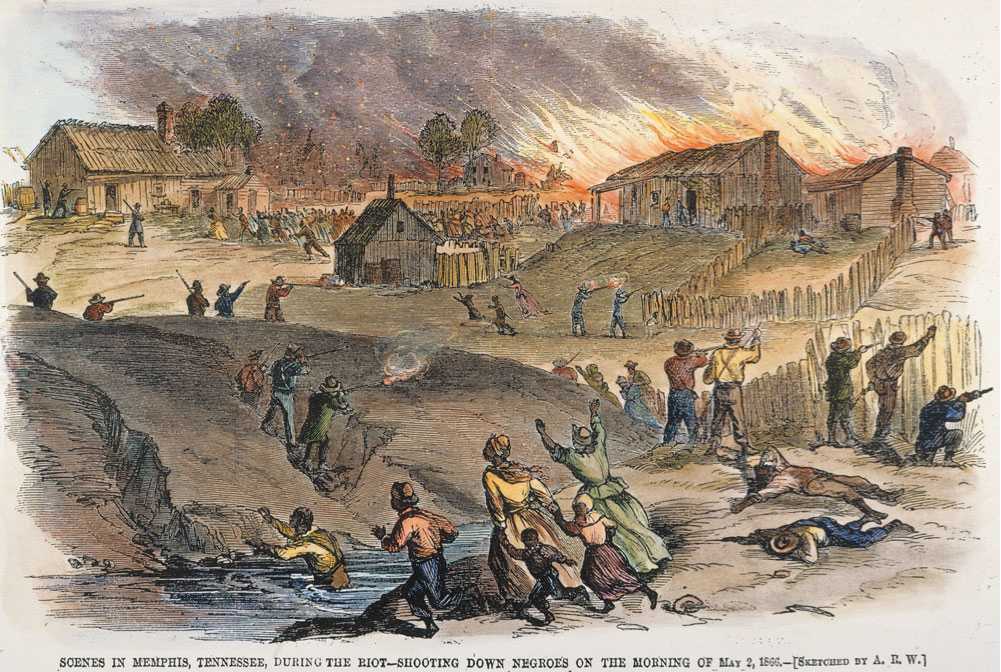For all these reasons the Republicans in Congress rejected Johnsonian Reconstruction. Quickly they created a joint committee on Reconstruction, headed by Senator William P. Fessenden of Maine, a moderate, to study the question of readmitting the southern states.

After Union troops seized Memphis in 1862, liberated slaves flocked to the city. By 1865, its black population had increased from 3,000 to 20,000. In May, 1866 racial tensions ignited a riot that killed forty-six blacks and two whites. The slaughter of so many blacks angered Republicans and weakened Johnson.
The committee held public hearings that produced much evidence of the mistreatment of blacks. Colonel George A. Custer, stationed in Texas, testified: “It is of weekly, if not of daily occurrence that Freedmen are murdered.” The nurse Clara Barton told a gruesome tale about a pregnant woman who had been brutally whipped. Others described the intimidation of blacks by poor whites. The hearings strengthened the Radicals, who had been claiming all along that the South was perpetuating slavery under another name.
President Johnson’s attitude speeded the swing toward the Radical position. While the hearings were in progress, Congress passed a bill expanding and extending the Freedmen’s Bureau, which had been established in March 1865 to care for refugees. The bureau, a branch of the war department, was already exercising considerable coercive and supervisory power in the South. Now Congress sought to add to its authority in order to protect the black population.
Although the bill had wide support, Johnson vetoed it, arguing that it was an unconstitutional extension of military authority in peacetime. Congress then passed a Civil Rights Act that, besides declaring specifically that blacks were citizens of the United States, denied the states the power to restrict their rights to testify in court, to make contracts for their labor, and to hold property. In other words, it put teeth in the Thirteenth Amendment.
Once again the president refused to go along, although his veto was sure to drive more moderates into the arms of the Radicals. On April 9, 1866, Congress repassed the Civil Rights Act by a two-thirds majority, the first time in American history that a major piece of legislation became law over the veto of a president. This event marked a revolution in the history of Reconstruction. Thereafter Congress, not President Johnson, had the upper hand.
In the clash between the president and Congress, Johnson was his own worst enemy. His language was Often intemperate, his handling of opponents inept, his analysis of southern conditions incorrect. He had assumed that the small southern farmers who made up the majority in the Confederacy shared his prejudices against the planter class. They did not, as their choices in the postwar elections demonstrated. In fact, Johnson’s hatred of the southern aristocracy may have been based more on jealousy than on principle. Under the Reconstruction plan, persons excluded from the blanket amnesty could apply individually for the restoration of their rights. When wealthy and socially prominent Southerners flocked to Washington, hat in hand, he found their flattery and humility exhilarating. He issued pardons wholesale. “I did not expect to keep out all who were excluded from the amnesty,” he explained. “I intended they should sue for pardon, and so realize the enormity of their crime.”
The president misread northern opinion. He believed that Congress had no right to pass laws affecting the South before southern representatives had been readmitted to Congress. However, in the light of the refusal of most southern whites to grant any real power or responsibility to the freed-men (an attitude that Johnson did not condemn), the public would not accept this point of view. Johnson placed his own judgment over that of the overwhelming majority of northern voters, and this was a great error, morally and tactically. By encouraging white Southerners to resist efforts to improve the lot of blacks, Johnson played into the hands of the Radicals.
The Radicals encountered grave problems in fighting for their program. Northerners might object to the Black Codes and to seating “rebels” in Congress, but few believed in racial equality. Between 1865 and 1868, Wisconsin, Minnesota, Connecticut, Nebraska, New Jersey, Ohio, Michigan, and Pennsylvania all rejected bills granting blacks the vote.
The Radicals were in effect demanding not merely equal rights for freedmen but extra rights; not merely the vote but special protection of that right against the pressure that southern whites would surely apply to undermine it. This idea flew in the face of conventional American beliefs in equality before the law and individual self-reliance. Such protection would involve interference by the federal government in local affairs, a concept at variance with American practice. Events were to show that the Radicals were correct—that what amounted to a political revolution in state-federal relations was essential if blacks were to achieve real equality. But in the climate of that day their proposals encountered bitter resistance, and not only from white Southerners.
Thus, while the Radicals sought partisan advantage in their battle with Johnson and sometimes played on war-bred passions in achieving their ends, they were taking large political risks in defense of genuinely held principles.
•••-[Read the Document Southern Skepticism of the Freedmen's Bureau at Www. myhistorylab. com




 World History
World History









